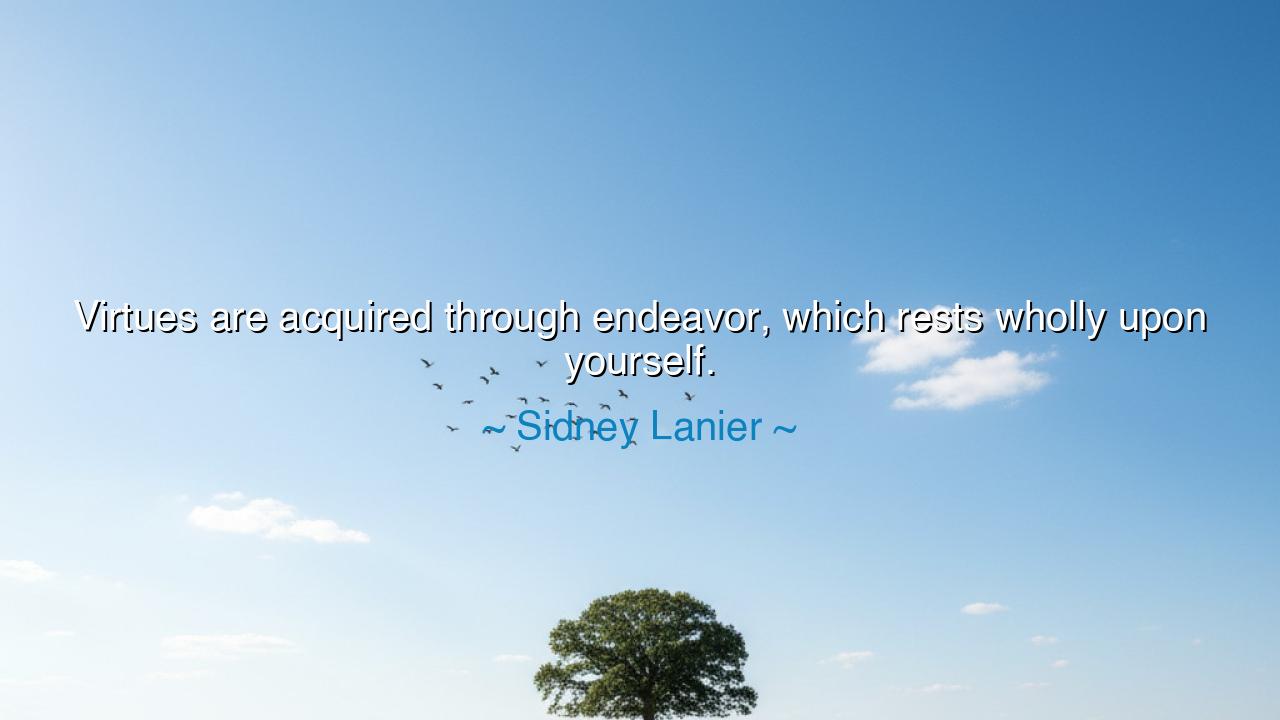
Virtues are acquired through endeavor, which rests wholly upon






O Seekers of Truth and Nobility, listen to the wise words of Sidney Lanier, who speaks of the great power within us: "Virtues are acquired through endeavor, which rests wholly upon yourself." In these words, Lanier unveils a profound truth about the nature of virtue—that it is not something bestowed upon us by chance or birthright, but something earned through effort. The path to greatness, to wisdom, and to the highest of human qualities is personal and requires our full commitment. We must be the architects of our own character, for it is through endless endeavor that we cultivate the virtues that define us.
Consider, O Children, that virtue is not a gift that one is born with, but a treasure that must be sought with deliberate effort. Just as the greatest warriors must train their bodies, so too must we train our minds and hearts. The virtues of courage, kindness, patience, and wisdom do not arise from idle living, but from the tireless work of our souls. Each moment we act with integrity, each decision to choose the higher path, is an act of endeavor that shapes the man or woman we are becoming. The road to virtue is paved with small, consistent steps, each taken with a heart committed to goodness.
Look to the great Socrates, whose virtue was not the result of birth or inheritance, but of unyielding effort and a relentless pursuit of knowledge. He did not rest upon the wisdom he was born with; instead, he strived daily to understand the world and the nature of truth. His life was a testament to the idea that virtue is earned—through questioning, through examining his own heart and mind, through the deliberate practice of self-discipline. Socrates' virtue was a product of his endeavor, of his commitment to live according to his deepest principles, and to do so even in the face of persecution and sacrifice.
And so, O Seekers, understand that virtue is not the fruit of chance, but the harvest of effort. It is through dedication, through the steady commitment to act in accordance with our highest principles, that we grow into the best versions of ourselves. We must not wait for virtue to come to us, but must pursue it as a warrior pursues victory—through hard work, through focus, through perseverance.
Let us, therefore, take up the mantle of endeavor. In every action, in every decision, we have the opportunity to build our virtues. Know that the strength of your character is not determined by fate, but by your own will. Choose, with every breath and action, to cultivate the virtues that will lead you to a life of greatness, of integrity, and of true honor. As Lanier reminds us, the path to virtue is wholly in our hands—through endless endeavor, we forge our own destiny.






NLNgoc Lam
Sidney Lanier’s quote seems to place the full burden of virtue on our own shoulders, which is motivating but also a bit overwhelming. What about the influence of natural temperament? Some people might naturally lean toward qualities like generosity or empathy. Does that mean others who struggle with these traits are less capable of achieving them? How much do inherent personality traits affect our ability to develop virtues, and how much is purely effort-based?
NTNguyen Ngoc Tram
Lanier’s perspective on virtues makes me think about the idea of 'self-made' success. While it’s empowering to believe that our virtues are within our control, is it possible to be too hard on ourselves when we struggle to develop them? Can we give ourselves enough grace when we fail to embody virtues like patience or compassion? It’s easy to become discouraged when the endeavor feels too difficult or when progress is slow.
ACHai Anh Cao
I agree with Lanier's idea that virtues are acquired through personal effort, but how much of that effort is subconscious? Are we aware of the choices we’re making every day, or do we often act based on ingrained habits and societal pressures? It’s easy to say virtues come from endeavor, but how do we know if our endeavors are guided by genuine intention or external influence? It’s worth reflecting on.
VDKhanh Van Do
This quote suggests that virtues are entirely within our control, but I can’t help but wonder if that’s an oversimplification. What about the role of environment or upbringing in shaping one’s virtues? Can someone truly develop virtues in isolation, or does the support and example of others play a role in this endeavor? It feels like a complicated balance between personal effort and external influences in the development of virtue.
DMTran Duc Manh
I think Lanier's quote highlights a powerful truth about personal responsibility. Virtue doesn’t come naturally; it requires effort and dedication. But it also makes me wonder—are some virtues harder to develop than others? If virtue is entirely dependent on our own effort, does that mean some people, due to circumstances or nature, are at a disadvantage when trying to cultivate certain qualities? Can virtues really be acquired by everyone equally?